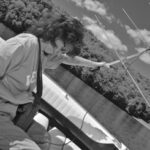Theodora Pinou, Western Connecticut State University – Teaching the Environment
 How do we teach students about the environment in a meaningful way?
How do we teach students about the environment in a meaningful way?
Theodora Pinou, professor of biology at Western Connecticut State University, steps outside to find out.
Dr. Pinou is a professor of Biology at WCSU, and a Curatorial Affiliate in Vertebrate Zoology at the Peabody Museum of Natural History at Yale University. She received her BA, MA, and Ph.D at New York University in Biology, with a focus in vertebrate evolution and ecology.
Teaching the Environment
Understanding our natural environment can help us thrive, but too many of us never learn about environmental forces that affect our well-being. I have been experimenting with different ways to teach about the environment in middle school, high school and college. For younger students, we talk about obvious things like plants, animals, and molds. This creates curiosity and builds empathy for the next big step – thinking about how the environment affects us humans! We bring in science and math to show how to make data-driven decisions about an organism’s behavior, and then we ask what personal action you can take to make the environment better or safer. We involve teachers and families, too, because we are trying to find out whether young people learn better in the classroom or at home.
In high school, we start to look at the jobs that are available if you care about the environment, as well as paths to higher education. We want to help at-risk students, especially, understand the available infrastructure and use it to improve their performance.
Our newest push is with graduate students training to be science educators. New standards in Connecticut require teachers to explain natural phenomena, and the state gives a lot of canned examples. But just look out the window! You can learn about climate change, habitat fragmentation, water quality, the effect of population increases right outside your back door. The best education trains students in the younger grades to be curious about the natural system, but it also works on top, so teachers can teach from a position of strength and knowledge.



Thanks & Cheers
Laird Smitty`